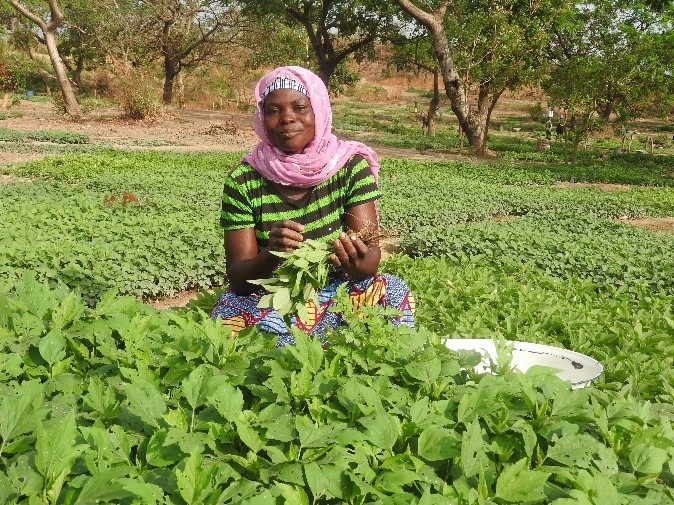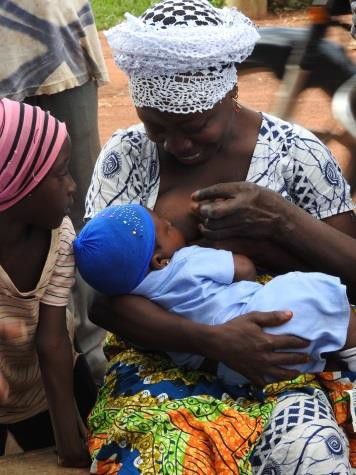Welcome - RING
USAID Resiliency in Northern Ghana Project (RING)
Project Summary and Goals
Resiliency in Northern Ghana (RING) is a five-year integrated project that contributes to the government of Ghana’s (GOG) and the U.S. Government Feed the Future Initiative’s efforts to sustainably reduce poverty and malnutrition. The project aims to improve the livelihoods and nutritional status of vulnerable households in 17 districts in the food-insecure Northern Region. RING interventions are implemented through 17 Metropolitan, Municipal and District Assemblies (MMDAs) and the Northern Regional Coordinating Council (NRCC), along with technical assistance from Global Communities Inc., a U.S. based non- governmental organization.
RING is designed to contribute to the FTF goals of decreasing stunting, wasting, underweight and anemia by 20% among women and children under five; as well as to double the incomes of at least 80% of the target households. The project will accomplish these targets by achieving the following objectives:
Increased quality of food consumed by women and children by improving access to savings and loans, exploring alternative income streams, and promoting diverse nutritious crop production and consumption;
Increased adoption of positive nutrition, sanitation and hygiene behaviors, especially among women and children; and
Strengthened local support networks, such as regional and district governments, and community groups, in their ability to identify and address needs related to livelihoods and nutrition.
Project Duration
2014 -2019
Implementing Partner
Global Communities; Northern Regional Coordinating Council (NRCC); and 17 Metropolitan, Municipal and District Assemblies(MMDAs): Tamale Metro, Kumbungu, Savelugu, Gushegu, Sagnarigu, Tolon, Central Gonja, West Gonja, Karaga, East Gonja, East Mamprusi, North Gonja, Namumba North, Namumba South, Kpandai, Saboba, and Chereponi
Geographical Coverage
Northern Region, districts:
- Tamale Metro, Kumbungu, Savelugu, Gushegu, Sagnarigu;
- Tolon, Central Gonja, West Gonja, Karaga, East Gonja, East Mamprusi;
- North Gonja, Namumba North, Namumba South, Kpandai, Saboba, and Chereponi.
Funding
US$ 60,000,000
Achievements
- Supported more than 96,000 poor households to grow diverse, nutritious foods such as leafy green vegetables, soy beans and orange-fleshed sweet potatoes for consumption and income generation;
- Savings of more than GHs21.24 million (US$4.8 million) and GHS6.2 million (US$1.23 million) in small loans provided to vulnerable women through the formation of over 2,868 Village Savings and Loans Associations (VSLA), comprising roughly 79,000 women. The women use their savings and loans to invest in small businesses, boosting their income particularly during the dry, food-insecure season;
- More than 398 communities certified as open defecation free (ODF) by changing specific behaviors and constructing, over 13,700 subsidy-free, basic household latrines and 11,700 hand washing stations;
- Nearly 3,600 health workers, 1000 non-health staff and more than 6,800 community health volunteers trained to promote household nutrition and address acute malnutrition at local health facilities; and
- More than 1,700 mothers’ support groups formed and trained, enabling pregnant and lactating mothers to share best nutrition practices on complementary feeding, weaning, and disease control and prevention.

Mrs. Abdul-Rahaman Sawda, RING beneficiary in Nasamba in the Nanumba South District harvesting leafy green vegetables from her dry season drip irrigation garden. Photo Credit: Mohammed Ali, Global Communities, RING

Photo credit: Kristen Kappos, Global Communities, RING
Highlights of Planned Activities for FY 2018
RING will intensify efforts to scale-up of Community Led Total Sanitation (CLTS) in remaining districts to support the GOG’s goal to make Northern Region open-defecation free by 2019. RING will intensify efforts on the promotion of Orange Flesh Sweet Potato (OFSP) production and consumption to increase household incomes and improve household consumption of nutritious diets.
The project will build on the momentum of the existing VSLA strategy and expand the approach to beneficiaries of the GOG’s cash transfer program, Livelihood Empowerment Against Poverty (LEAP) program. The project also continues efforts to strengthen district sub-structures to improve governance and accountability. RING will provide a comprehensive monitoring and evaluation technical support to the 17 MMDAs, and the NRCC to improve data quality for decision making.
Finally, RING will focus its efforts on strengthening the district assemblies to continue RING interventions after the project closes by improving program monitoring, data utilization, strategic planning efforts, as well as, institutionalizing innovation technology to enhance the quality of agriculture, livelihoods, nutrition, and WASH service delivery.
Key Staff Contacts
Joseph Ashong,
Nutrition Specialist -
USAID Ghana,
jashong@usaid.gov
Yunus Abdulai,
Chief of Party - RING Project,
yabdulai@ghanaresiliency.org
RING ARCGIS STORY MAP
https://storymaps.arcgis.com/stories/20103f71e4ac4ffdaaed41cdda4d6887
